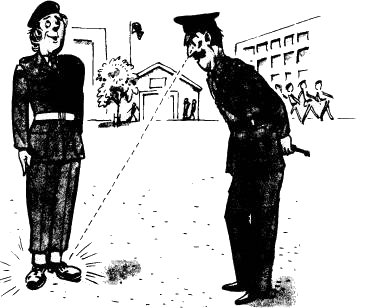 Fred was a young soldier in a big camp. During the week they always worked very hard, but it was Saturday, and all the young soldiers were free, so their officer said to them, 'You can go into the town this afternoon, but first I'm going to inspect you.
Fred was a young soldier in a big camp. During the week they always worked very hard, but it was Saturday, and all the young soldiers were free, so their officer said to them, 'You can go into the town this afternoon, but first I'm going to inspect you. Fred came to the officer, and the officer said to him, "Your hair's very long. Go to the barber and then come back to me again."
Fred ran to the barber's shop, but it was closed because it was Saturday. Fred was very sad for a few minutes, but then he smiled and went back to the officer.
"Are my boots clean now, sir?" he asked.
The officer did not look at Fred's hair. He looked at his boots and said, "Yes, they're much better now. You can go out. And next week, first clean your boots, and then come to me!"
A) Which of these sentences are true (T) and which are faIse (F)? Write T or F.
1. The soldiers were free on Sundays.
2. The soldiers went to town every afternoon.
3. The officer inspected the soldiers.
4. The barber's shop was c1osed.
5. Fred c1eaned his boots.
6. The officer looked at Fred's boots.
B) Answer these questions.
1. What was Fred?
2. What did he do during the week?
3. What did his officer say to the soldiers on Saturday?
4. What did he say to Fred?
5. What did Fred do then?
6. What did he say to the officer?
7. Did the officer look at Fred's hair now?
8. What did he say to Fred?
C) Opposites. Put one word in each empty place.
1. The soldiers' work was not easy during the week: they worked . . . .
2. They did not work on Saturday: they were . . . then.
3. Fred's hair was not . . .: it was very long.
4. Fred was not . . .: he was sad.
5. His boots were not . . .: they were c1ean.
6. The officer did not say, "Your boots are. . . now": He said, "Your boots are better now."

